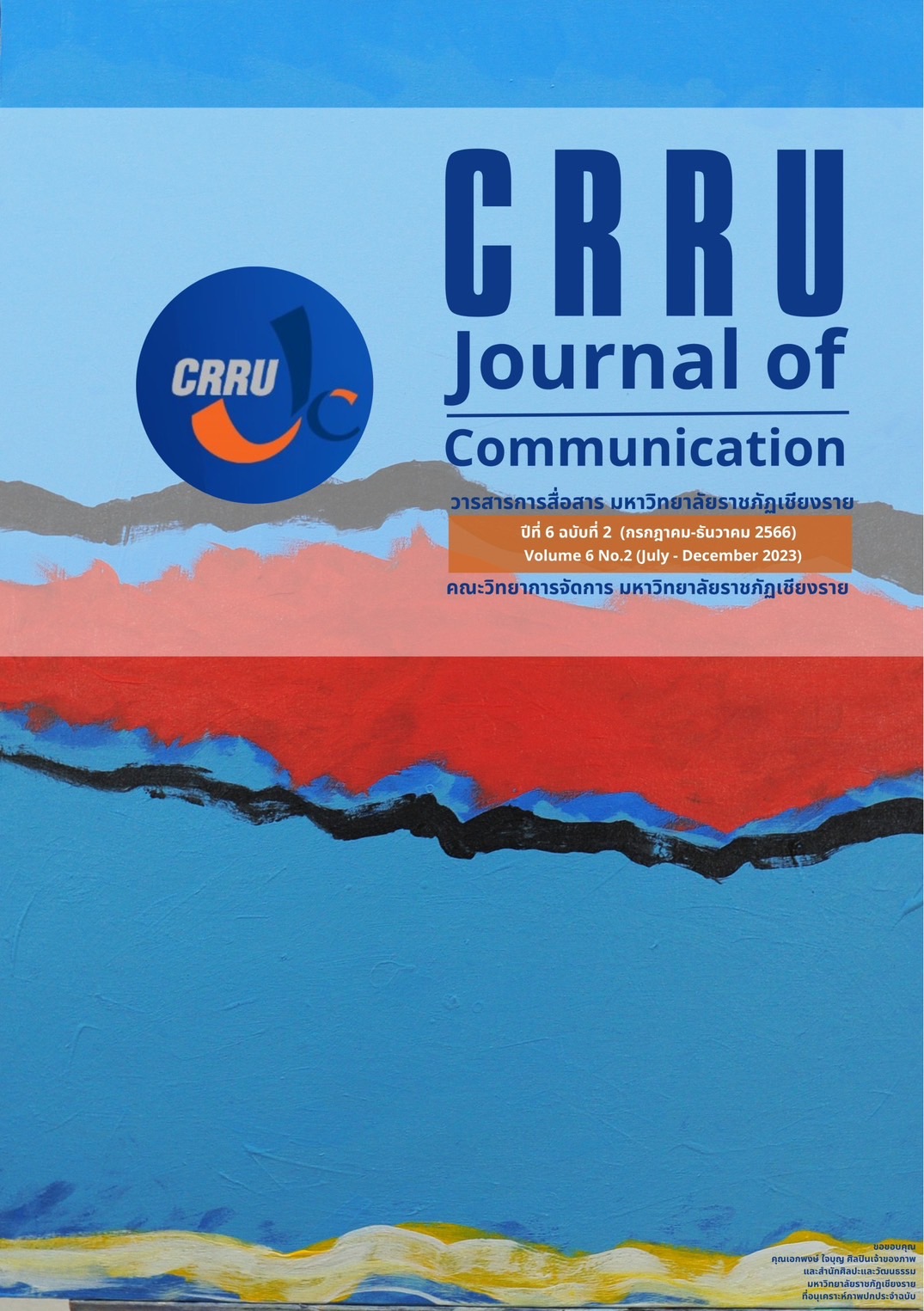TikTok กับการประกอบสร้างโลกความเป็นจริงของตัวตนในยุคดิจิทัล
Main Article Content
บทคัดย่อ
การประกอบสร้างความจริงทางสังคมนั้น เป็นทฤษฎีทางด้านการสื่อสารที่มุ่งเน้นศึกษาบทบาทของสื่อมวลชนที่ได้สื่อสารเรื่องราวจนผู้รับสารมีความเชื่อ และมองว่าประเด็น
ที่สื่อสารนั้นเป็นเรื่องจริง แม้จะไม่รู้ว่าความจริงแท้เป็นอย่างไรก็ตาม ซึ่งการศึกษาครั้งนี้
เป็นการศึกษาร่วมกับแพลตฟอร์มดิจิทัล TikTok ซึ่งเป็นแพลตฟอร์มที่เติบโตและครองใจผู้รับสารในปัจจุบัน ทำให้ผู้รับสารเปลี่ยนตนเองเป็นผู้ส่งสาร และทำหน้าที่ในการใช้สื่อดังกล่าวประกอบสร้างความจริงให้กับสังคม
จากการศึกษาและวิเคราะห์ทำให้ พบว่า แพลตฟอร์ม TikTok นั้น ประกอบสร้างความจริงในสังคมผ่านตัวตนของผู้ส่งสาร ในรูปแบบต่าง ๆ (1) การเป็นเอนเตอร์เทนเนอร์ หรือสร้างความบันเทิง (2) การเป็นผู้รู้ ผู้เชี่ยวชาญ หรือ “กูรู” (3) การเป็นนักคิดสร้างสรรค์ และ (4) การเป็นนักขายที่มีสไตล์และตัวตนบนโลกออนไลน์ ซึ่งการประกอบสร้างดังกล่าวนั้นมีกลวิธีที่แตกต่างกันออกไป โดยอาศัยเครื่องมือของแพลตฟอร์ม TikTok คือ (1) การใช้ฟิลเตอร์ในการสร้างใบหน้าให้สดใสกว่าความเป็นจริง (2) การใส่ข้อความและกราฟิกสติ๊กเกอร์ประกอบ (3) การใส่เสียงเพลงหรือดนตรีประกอบ และ (4) การถ่ายทอดสด (Live)
อย่างไรก็ตาม การประกอบสร้างความจริงในความเป็นตัวตนของผู้ส่งสารนั้น อาจไม่ได้สะท้อนความเป็นตัวตนของผู้ส่งสาร หรือ TikToker คนนั้นเสมอไป เพราะพฤติกรรม บทบาท
การแสดงออก ที่เห็นอาจเป็นเพียงโลกของความหมาย ที่ผู้รับสารได้มองหรือเชื่อในสิ่งที่ TikToker สื่อสารออกมา
Article Details
เอกสารอ้างอิง
กระทรวงดิจิทัลเพื่อเศรษฐกิจและสังคม. (2565). ดีอีเอส พบแนวโน้มโกงซื้อขายออนไลน์ผ่าน TikTok ขาขึ้น. สืบค้นจาก https://mdes.go.th/news/detail/5767-ดีอีเอส-พบแนวโน้มโกงซื้อขายออนไลน์ผ่าน-TikTok-ขาขึ้น
กาญจนา แก้วเทพ, กำจร หลุยยะพงศ์, จันทนา ทองประยูร, บุษบา สุธีธร และ สมสุข หินวิมาน. (2557). ปรัชญานิเทศาสตร์และทฤษฎีการสื่อสาร. กรุงเทพฯ: มหาวิทยาลัยสุโขทัยธรรมาธิราช.
ณัฏฐพงษ์ สายพิณ. (2563). ปรากฏการณ์ทางวัฒนธรรมวิชวลผ่าน TikTok ในสังคมไทย. วารสาร สาร สื่อ ศิลป์, 3(5), 55-66.
นลินทิพย์ เนตรวงศ์. (2559). ภาพตัวแทน “ผู้ชายในฝัน” ในละครโทรทัศน์แนวโรมานซ์. (วิทยานิพนธ์วารสารศาสตรมหาบัณฑิต). มหาวิทยาลัยธรรมศาสตร์. กรุงเทพฯ.
ภรภัทร ธัญญเจริญ. (2564). พฤติกรรมการเปิดรับ ทัศนคติ และการตัดสินใจใช้งานแอปพลิเคชัน TikTok. (วิทยานิพนธ์นิเทศศาสตรมหาบัณฑิต). มหาวิทยาลัยธุรกิจบัณฑิตย์. กรุงเทพฯ.
AP. (2566). ซีอีโอ 'ติ๊กตอก' ตอบคำถามวุฒิสภาสหรัฐฯ กรณีความกังวลด้านความมั่นคง.
สืบค้นจาก https://www.voathai.com/a/tiktok-ceo-faces-off-with-congress-over-security-fears/7018749.html
Berger, P. L., and Luckmann, T. (1966). The Social Construction of Reality: A Treatise in the Sociology of Knowledge. London: Penguin Group.
Chula. (2563). อาจารย์จุฬาฯ วิจัย “ผลกระทบของสื่อสังคมออนไลน์ ต่อการเปลี่ยนแปลง ทางสังคมและวัฒนธรรม ไทย. สืบค้นจาก https://www.chula.ac.th/news/27969/
Nattapon Muangtum. (2565). สรุปข้อมูลผู้ใช้งาน TikTok Data Stat & Insight 2022. สืบค้นจาก https://www.everydaymarketing. co/trend-insight/tiktok-data-stat-and-insight-thailand-2022-we-are-social/
Sarun Rojanasoton. (2565). ทำความรู้จัก “User-Generated Content” โอกาสใหม่สำหรับนักการตลาด. สืบค้นจาก https://www.thumbsup.in.th/benefit-of-ugc-marketing-opportunity
TikTok. (2565). ครั้งแรกกับงานมอบรางวัลสุดยิ่งใหญ่ "TikTok Awards Thailand 2022" ยกระดับครีเอเตอร์ไทยสู่สากล. สืบค้นจาก https://newsroom.tiktok.com/th-th/inaugural-tiktok-awards-thailand-2022-honoring-local-creators


